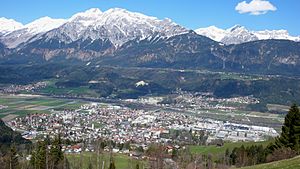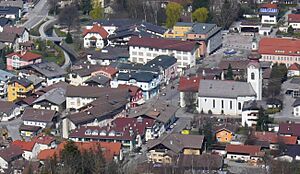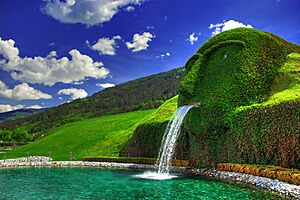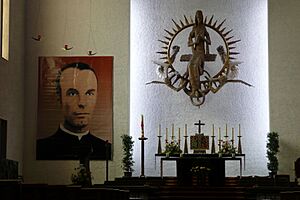Wattens facts for kids
Quick facts for kids
Wattens
|
||
|---|---|---|

View over Wattens and the Inn Valley
to the Karwendel mountains |
||
|
||
| Country | Austria | |
| State | Tyrol | |
| District | Innsbruck Land | |
| Area | ||
| • Total | 10.84 km2 (4.19 sq mi) | |
| Elevation | 564 m (1,850 ft) | |
| Time zone | UTC+1 (CET) | |
| • Summer (DST) | UTC+2 (CEST) | |
| Postal code |
6112
|
|
| Area code | 05224 | |
| Vehicle registration | IL | |
Wattens is a small town in the Tyrol region of Austria. It is most famous for being the home of the Swarovski company, which makes beautiful crystal glass products.
Contents
Exploring Wattens: Location and Travel
Wattens is located in a valley called the Lower Inn Valley in North Tyrol. It is about 13 kilometers (8 miles) east of Innsbruck, a larger city. The town stretches from the southern bank of the Inn River into a side valley called Wattental. This valley leads up to the Tux Alps mountains.
You can easily reach Wattens by car using the Inn Valley Autobahn (A 12). It also has a train station, Fritzens-Wattens, served by ÖBB trains.
A Look Back: The History of Wattens
People have lived in the Wattens area since ancient times, specifically the La Tène era. The name "Wattens" was first written down in a document from the year 930. At that time, this area was part of a German region called Bavaria. Later, in the 12th century, the Counts of Tyrol took control. In 1363, the House of Habsburg, a powerful Austrian family, gained ownership of the region.
In 1559, the first paper mill in Austria was built in Wattens. This helped the local economy grow. A big change happened in 1895 when Daniel Swarovski (1862–1956) moved to Wattens. He was a skilled glass cutter from Bohemia. He came to start his company, making crystal jewelry. Because of this growth, Wattens was given "market rights" in the same year, meaning it could hold regular markets.
People in Wattens: Population Over Time
| Historical population | ||
|---|---|---|
| Year | Pop. | ±% |
| 1869 | 838 | — |
| 1880 | 816 | −2.6% |
| 1890 | 874 | +7.1% |
| 1900 | 968 | +10.8% |
| 1910 | 2,000 | +106.6% |
| 1923 | 2,300 | +15.0% |
| 1934 | 3,233 | +40.6% |
| 1939 | 3,372 | +4.3% |
| 1951 | 4,364 | +29.4% |
| 1961 | 5,402 | +23.8% |
| 1971 | 6,249 | +15.7% |
| 1981 | 6,300 | +0.8% |
| 1991 | 6,804 | +8.0% |
| 2001 | 7,291 | +7.2% |
| 2011 | 7,625 | +4.6% |
The number of people living in Wattens has grown a lot over the years. In 1869, there were only 838 residents. By 2011, the population had increased to 7,625 people. This growth shows how the town has developed, especially with the success of its industries.
What Wattens Makes: Economy and Industry
The Swarovski company is the biggest employer in Wattens. In 1995, Swarovski celebrated 100 years of business. To mark this special occasion, they opened the Swarovski Kristallwelten (Crystal Worlds) museum. A famous artist named André Heller designed the museum. It has many interesting rooms, like old-fashioned "cabinets of curiosities." These rooms are similar to the historic ones at Ambras Castle.
The museum teaches visitors about how crystal is made. It also tells the story of Daniel Swarovski's life. You can see a huge collection of crystals, including art by famous people like Brian Eno and Niki de Saint Phalle. Today, Swarovski Crystal Worlds is one of the most popular places to visit in Austria. People from all over the world come to see it.
Other Interesting Places in Wattens
Wattens also has other museums. There is a typewriter museum, which shows old typing machines. The Museum Wattens tells the story of the town itself. It covers the history of Swarovski and the old paper mill. It also displays items found from ancient times in Wattens and nearby areas like Volders and Fritzens.
The historic paper mill is now the Wattenspapier factory. This factory is a top maker of rolling paper. Since 1980, it has been owned by the Finnish Delfort Group. A large part of the tobacco paper they make (97%) is sent to over 90 different countries.
Famous People from Wattens
Wattens is the birthplace of Jakob Gapp (1897–1943). He was a Marianist priest. In 1938, he openly spoke out against Austria joining Nazi Germany. Because of this, Gapp had to leave Austria. He went to France and then to Valencia in Spain. There, he continued to speak against the unfair treatment of people who resisted the Nazis.
In 1942, he was captured by Gestapo agents in German-occupied France. He was then taken to Berlin. At his trial, he was sentenced to death and executed in 1943. Jakob Gapp is remembered as a Christian martyr by the Catholic Church. He was honored by Pope John Paul II in 1996.
See also
 In Spanish: Wattens para niños
In Spanish: Wattens para niños
 | Shirley Ann Jackson |
 | Garett Morgan |
 | J. Ernest Wilkins Jr. |
 | Elijah McCoy |






